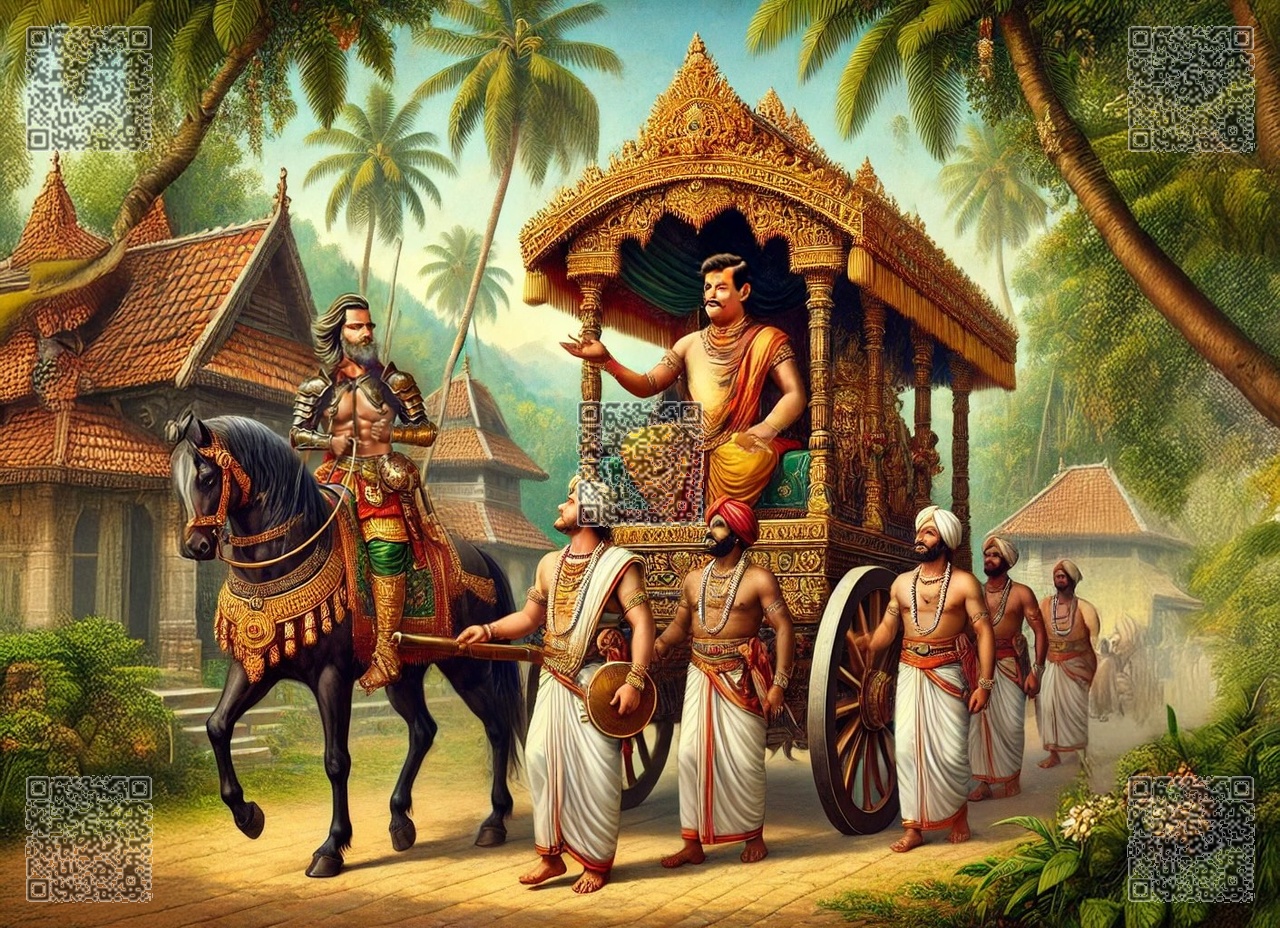A Farewell Journey to Chengotta
(A Short Story Inspired by an Anecdote from Shekharan Channar’s Life)
Long before dawn, torches flickered along the palace roads in Thiruvananthapuram. It was the day Diwan Sir T. Madhavarayar—an esteemed statesman—would depart his office and leave Travancore. Preparations were underway to send him off with all the respect and ceremony befitting his rank. Horses stomped, carriage wheels creaked, and the rhythmic footsteps of palace guards echoed in the still air.
Standing near the gate, Shekharan Channar waited quietly in the half-light. At nearly fifty years of age, he had spent years building a thriving liquor-lease enterprise under Madhavarayar’s benevolent administration. Rumors abounded that the Diwan’s resignation was fraught with royal discord, so few dared to publicly demonstrate loyalty to him—fewer still to follow him out of Travancore’s borders. Yet Shekharan had made a decision: no matter the potential consequences, he would accompany the Diwan on his journey to Chengotta, the frontier town where Travancore’s boundaries ended.
At sunrise, the palace gates swung open. A palanquin, draped in deep red cloth, rolled onto the main road. The Diwan, wearing a subdued yet dignified expression, nodded farewell to the court officials assembled to see him off. Guards in regal attire marched a short distance behind, forming a solemn procession.
Suddenly, from among the onlookers stepped Shekharan, his eyes alight with determination. He was dressed as a warrior, with a small leather pack slung across his shoulder. He was riding his horse. Though his garb lacked splendor, his bearing showed the unwavering pride and courage he was known for across the land. As the carriage advanced, Shekharan rode by the side—close enough to signal his support, yet respectful of the Diwan’s formal entourage.
All morning, they traveled along roads flanked by coconut groves and paddy fields shimmering in the sun. Curious villagers peered from doorways. Whispers spread that an influential merchant was following Sir T. Madhavarayar’s carriage on horse—someone seemingly unafraid of losing favor with the reigning court. From time to time, the Diwan glanced back. Noticing Shekharan’s unflagging stride, he gave a half-smile, silently acknowledging the bold loyalty behind each step.

After midday, the roads grew rugged, winding through rolling hills. The sun beat down without mercy, leaving even the palanquin carriers lathered in sweat. Exhausted guards began dropping back, their faces drawn. Still, Shekharan pressed on, unwavering. Memories of how the Diwan’s policies had shielded his business from excessive taxes kept him going. He was determined to repay kindness with gratitude, whatever the cost.
Dusk arrived. Bats wheeled across the violet sky. The retinue halted near a wayside rest house for the night. When the Diwan stepped out, he finally beckoned Shekharan closer. “You have rode many miles, friend. Rest here—there’s no need to follow me further,” he said gently.
Yet Shekharan bowed low. “I shall continue with you until Chengotta,” he replied. “For your guidance and fairness, I owe you that much.”
Quiet respect flickered in the Diwan’s gaze. He placed a hand on Shekharan’s shoulder, momentarily speechless. No official farewell or written tribute could have meant as much as this simple, unwavering act of devotion.
For two more days, they traveled across dusty roads, crossing small rivers and passing remote villages until the distant hills of Chengotta finally rose into view. As they reached the border post, Sir T. Madhavarayar brought his carriage to a final halt. A hush settled over the procession.
“My journey continues beyond our kingdom,” said the Diwan. “You must turn back here my friend. May fortune accompany you, Shekharan.”
Bowing once more, Shekharan struggled to hide his emotions. The Diwan stepped into his carriage, and with a wave of his hand, disappeared into the gathering twilight. Only when he was gone did Shekharan Channar turn toward home—his mind full of gratitude, pride, and a touch of melancholy.
In the years that followed, travelers and traders repeated the tale of how Shekharan Channar, risking royal displeasure, dutifully rode on the side of Sir T. Madhavarayar’s carriage to the very border of Travancore. They spoke of unwavering honor and steadfast loyalty—virtues Shekharan believed transcended fear or favor. And though that chapter of history would end at Chengotta, its echo lived on in every telling of his remarkable farewell journey.



